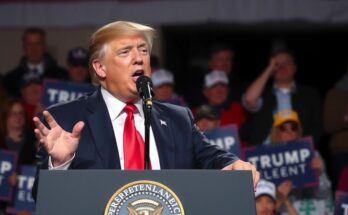Republicans have fortified their standing in Arizona elections, with Trump likely winning the state previously lost and a strong showing in local elections. Ruben Gallego’s anticipated Senate win could signify Democratic resilience, yet ongoing Republican dominance poses challenges for local Democratic representation. The political climate hints at increased gridlock in legislative processes. Voter priorities reflect a focus on public safety over political reform, indicating prevailing conservative sentiments in state governance.
Recent elections have signaled a significant Republican advantage in Arizona, implying that this historically pivotal state may now be more solidly in Republican hands. Donald Trump appears poised to reclaim Arizona, having narrowly lost it in the previous election. While Democrat Ruben Gallego is likely to secure a Senate seat, Republicans succeeded in major local elections, winning all Arizona Corporation Commission positions and maintaining control in Maricopa County. This directional shift bears implications for both state and national politics, as Republicans maintain dominance not just in Arizona but also in multiple legislative contexts throughout the United States. The Republican party’s resurgence can be attributed to Trump’s extraordinary political comeback, positioning the party strongly moving forward. Nationwide, the GOP gained a firm grip on the federal government, successfully reclaiming the U.S. Senate and narrowly holding onto the House of Representatives. This consolidation power in both state and federal governments enables Republicans to steer the agenda with fewer checks, raising concerns about an expansive, uncompromised administration that reflects Trump’s policies. In Arizona, Gallego’s potential historic victory would mark a significant representation shift, as he would be the first Hispanic senator from the state, echoing the demographics of Arizona, where a third of the population is Hispanic. His win could suggest a renewed strength in the Democratic presence at the federal level in Arizona. Conversely, the Republicans’ control of numerous local seats poses challenges for Gallego and other state Democrats, especially if they intend to pass significant legislation. The political landscape suggests a tendency towards gridlock with Republicans holding power in both the House and Senate. This is further complicated by the recent loss of moderates within the GOP context, which may foster a less collaborative legislative atmosphere. Legislative outcomes will likely face opposition from the Democratic governor, Katie Hobbs, increasing the stakes for compromise and agreement on vital policies moving forward. Evaluations of the recent propositions also highlight public sentiment, with issues of public safety taking precedence over potential political rearrangements. Proposals aimed at enhancing public safety seem to resonate with voters, reflecting community priorities. However, initiatives aimed at structural changes in the political landscape, such as reforming the primary system, did not fare well, suggesting limited appetite for major systemic change at this moment in time. Overall, the recent elections underscore a strengthening Republican foothold in Arizona, coupled with a pivotal Democratic influence in federal representation.
This article reflects on the outcomes of recent elections in Arizona, where Republicans gained significant ground, contrasting previous election cycles notably characterized by a more competitive political landscape. The state transitioned towards ongoing governance associated with Republican leadership while highlighting emerging challenges such as balancing the local Democratic presence, notably with the Senate candidacy of Ruben Gallego. The implications extend beyond state borders, relating thematically to the national political narrative surrounding Trump’s influence and the control dynamics within Congress. Amid this evolving political backdrop, Arizona serves as a focal point for understanding broader trends in American governance, encompassing important facets such as voting rights, public safety legislation, and the realities of legislative gridlock ingrained into the political discourse of the present.
In summary, the election results in Arizona indicate a significant consolidation of Republican power, with implications both at the local and national levels. While Trump’s political resurgence demonstrates considerable Republican strength, the potential victory of Democrat Ruben Gallego in the Senate offers a counterbalance and maintains a Democratic foothold in the state. Voter priorities emphasize public safety, underscoring the complex political landscape marked by a dynamic push and pull between party influence and constituent interests, leaving considerable uncertainties about potential legislative gridlock and cooperation in governing going forward.
Original Source: www.azcentral.com




